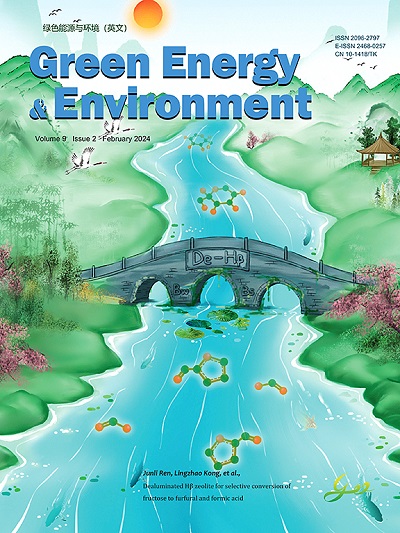构建基于无金属半导体材料和共价有机框架的二维异质结,实现优异的太阳能催化性能
IF 14.6
1区 工程技术
Q1 CHEMISTRY, PHYSICAL
引用次数: 0
摘要
共价有机框架(COFs)是一种新开发的结晶物质,因其超高孔隙率、结晶性和易于改性的结构而受到越来越多的关注,在光催化领域大有可为。然而,由于纯 COFs 材料存在严重的载流子重组问题,因此很难实现出色的光催化制氢。为了缓解这一关键问题,建立异质结被认为是一种有效的方法。然而,许多用于与 COFs 构建异质结的含金属材料都有许多缺点,包括比表面积小、活性位点稀少(无机半导体材料)、带隙较宽和制备成本较高(MOFs)。因此,有必要选择易于制备的无金属材料。红磷(RP)作为一种不含金属成分的半导体材料,具有合适的带隙、适中的氧化还原电位和相对较低的毒性,价格低廉且易于获得。本文通过溶热法成功制备了一系列 RP/TpPa-1-COF (RP/TP1C)复合材料。两种材料的二维结构使材料之间具有很强的相互作用,异质结的构建有效抑制了光生电荷载流子的重组。因此,具有最佳光催化能力的 9% RP/TP1C 复合材料的光催化 H2 演化率达到了 6.93 mmol g-1 h-1,与裸 RP 相比提高了 10.19 倍,与纯 TP1C 相比提高了 4.08 倍。这篇文章为开发基于 COFs 的高效光催化剂提供了一种新颖的创新方法。本文章由计算机程序翻译,如有差异,请以英文原文为准。
Construction of two-dimensional heterojunctions based on metal-free semiconductor materials and Covalent Organic Frameworks for exceptional solar energy catalysis
Covalent organic frameworks (COFs) are newly developed crystalline substances that are garnering growing interest because of their ultra-high porosity, crystalline nature, and easy modified architecture, showing promise in the field of photocatalysis. However, it is difficult for pure COFs materials to achieve excellent photocatalytic hydrogen production due to their severe carrier recombination problems. To mitigate this crucial issue, establishing heterojunction is deemed an effective approach. Nonetheless, many of the metal-containing materials that have been used to construct heterojunctions with COFs own a number of drawbacks, including small specific surface area and rare active sites (for inorganic semiconductor materials), wider bandgaps and higher preparation costs (for MOFs). Therefore, it is necessary to choose metal-free materials that are easy to prepare. Red phosphorus (RP), as a semiconductor material without metal components, with suitable bandgap, moderate redox potential, relatively minimal toxicity, is affordable and readily available. Herein, a range of RP/TpPa-1-COF (RP/TP1C) composites have been successfully prepared through solvothermal method. The two-dimensional structure of the two materials causes strong interactions between the materials, and the construction of heterojunctions effectively inhibits the recombination of photogenic charge carrier. As a consequence, the 9% RP/TP1C composite, with the optimal photocatalytic ability, achieves a photocatalytic H2 evolution rate of 6.93 mmol g−1 h−1 , demonstrating a 10.19-fold increase compared to that of bare RP and a 4.08-fold improvement over that of pure TP1C. This article offers a novel and innovative method for the advancement of efficient COFs-based photocatalysts.
求助全文
通过发布文献求助,成功后即可免费获取论文全文。
去求助
来源期刊

Green Energy & Environment
Energy-Renewable Energy, Sustainability and the Environment
CiteScore
16.80
自引率
3.80%
发文量
332
审稿时长
12 days
期刊介绍:
Green Energy & Environment (GEE) is an internationally recognized journal that undergoes a rigorous peer-review process. It focuses on interdisciplinary research related to green energy and the environment, covering a wide range of topics including biofuel and bioenergy, energy storage and networks, catalysis for sustainable processes, and materials for energy and the environment. GEE has a broad scope and encourages the submission of original and innovative research in both fundamental and engineering fields. Additionally, GEE serves as a platform for discussions, summaries, reviews, and previews of the impact of green energy on the eco-environment.
 求助内容:
求助内容: 应助结果提醒方式:
应助结果提醒方式:


